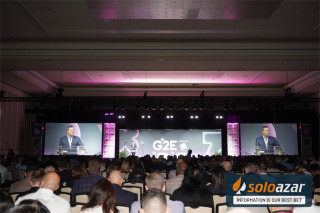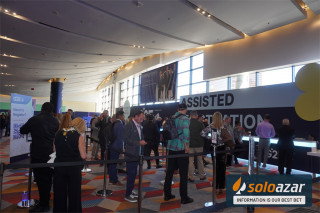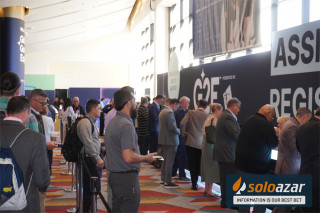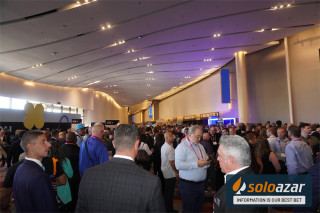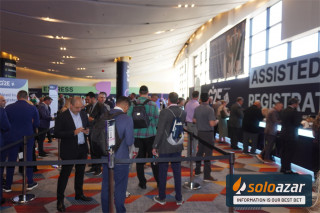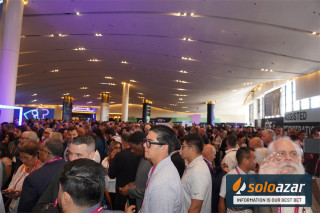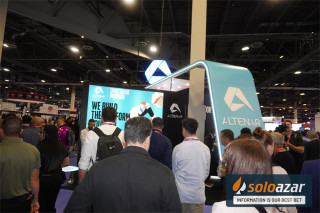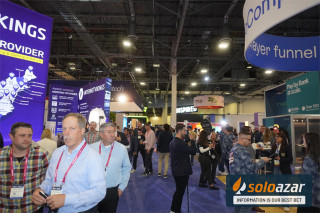Centralized Self-Exclusion, an effective measure to provide a comprehensive safety net for players
Monday 24 de March 2025 / 12:00
2 minutos de lectura
(Lakewood, NJ).- In the ever-evolving landscape of gaming regulation, ensuring the well-being of players is paramount. One effective measure gaining traction is the implementation of centralized self-exclusion databases. These systems allow individuals to voluntarily exclude themselves from all gaming platforms within a jurisdiction through a single registration, providing a comprehensive safety net for them. Read this report by Angela Wong, VP of Global Lottery Solutions, and Mike Randall, Responsible Gaming (RG) Specialist, GLI.

Understanding Self-Exclusion
Self-exclusion is a voluntary process where individuals request to be barred from gaming activities for a specified period. Traditionally, this required separate registration agreements with each gambling operator, a cumbersome process that often left gaps in protection. Centralized self-exclusion databases streamline this by enabling a one-time registration that applies across all licensed operators within a jurisdiction.
Global Examples of Centralized Self-Exclusion
Several jurisdictions have pioneered centralized self-exclusion systems.
- Argentina (City of Buenos Aires): LOTBA, the regulatory entity for all forms of gaming and lottery operator, centralizes self-exclusion with the ReVa (Registro Voluntario de Autoexclusión) which is valid for 2 years and limits the access to all gaming and lottery activities.
- Argentina (Province of Mendoza): The province offers a voluntary self-exclusion program that allows individuals to limit their access to all licensed gaming establishments and online platforms within its jurisdiction. This initiative also integrates a unified facial recognition system across all regulated gaming venues, effectively preventing excluded individuals from accessing gaming areas.
- Australia: Dataworks (formerly IXUP Limited) was awarded a contract to develop and operate BetStop, Australia’s National Self-Exclusion Register, by the Australian Communications and Media Authority (ACMA).
- Canada: The Province of Ontario is developing a centralized self-exclusion system for its iGaming market. iGaming Ontario has selected IXUP Limited to create a platform that will allow players to self-exclude from all regulated online gaming sites in the province through a single registration.
- Massachusetts: The state offers a voluntary self-exclusion program that enables individuals to exclude themselves from all licensed gaming establishments and online platforms within the state. Participants can choose exclusion periods ranging from one year to a lifetime ban.
- Missouri: The Missouri Gaming Commission administers a statewide voluntary exclusion program, allowing individuals to ban themselves from all casinos in the state. This program has been in place for more than a decade, providing support to those seeking assistance with problem gambling.
- New Jersey: The state has streamlined its self-exclusion process by allowing individuals to add their names to the self-exclusion list through the New Jersey Division of Gaming Enforcement’s website. This online option enhances accessibility and privacy for those wishing to self-exclude from casinos and online gambling platforms.
- Spain: The DGOJ which is the national Spain online gaming regulator, offers and maintains a central register for the player self-exclusion (self-prohibition), “Registro General de Interdicciones de Acceso al Juego (RGIAJ)”, which can be individuals can register voluntarily through a form, through the e-office of the DGOJ or through an application (operators must offer direct link to these services). This applies to online gaming operators and lotteries (ONCE and SELAE) and it is also communicated to the Autonomous Communities which would manage the land-based gaming according to the specific local regulations. The self-exclusion status can be cancelled only after 6 months from the date of the registration. The DGOJ provides services to the operators to verify and consult the registration and registration changes, respectively.
- Sweden: Sweden’s Spelpaus system offers a centralized self-exclusion service, enabling individuals to block themselves from all licensed gaming operators. Since its launch in 2019, more than 100,000 individuals have registered, reflecting its significant role in harm reduction.
- United Kingdom: The UK introduced GAMSTOP, a national online self-exclusion program, allowing players to exclude themselves from all online gaming operators licensed in the country. This initiative has been instrumental in providing a unified approach to player protection.
Benefits of Centralized Self-Exclusion
Research supports the effectiveness of centralized self-exclusion systems.
- Comprehensive Coverage: A centralized system ensures that once an individual opts for self-exclusion, all participating operators enforce the exclusion – ensuring a true timeout from gambling. This holistic approach is more effective than fragmented systems where individuals must self-exclude from each operator separately.
- Ease of Access: Centralized databases simplify the self-exclusion process, making it more accessible and less daunting for individuals seeking help. This ease of access can lead to higher participation rates and, consequently, better outcomes in harm reduction.
- Data Security and Privacy: With a centralized system, sensitive information is managed by a single entity, reducing the risk of data breaches and ensuring compliance with privacy regulations. This centralized management fosters trust among users, encouraging more individuals to utilize the service.
Challenges and Considerations of Centralized Self-Exclusion
While centralized self-exclusion systems offer numerous benefits, they are not without challenges.
- Implementation Complexity: Developing and maintaining a centralized database requires significant resources and coordination among regulators and operators. Ensuring seamless integration across all platforms is essential for the system’s effectiveness.
- Cross-Border Gambling: In regions where players have access to international gambling sites and locations, centralized self-exclusion may be less effective unless there is cooperation between jurisdictions. Addressing this issue requires international collaboration and agreements to extend the reach of self-exclusion measures.
Centralized self-exclusion databases represent a significant advancement in responsible gaming initiatives. By providing a streamlined, comprehensive, and secure method for individuals to manage their gaming activities, these systems enhance player protection and support the overall integrity of the gambling industry. As demonstrated by jurisdictions like Australia, Canada, Spain, Sweden, UK, and across various jurisdictions within the U.S. and Argentina, embracing centralized self-exclusion is a proactive step toward a safer gaming environment.
If your jurisdiction is wondering how to proceed with a centralized self-exclusion program or looking at any aspect of your RG regulatory environment, reach out to GLI for support and expertise.
As the Vice President of Global Lottery Solutions, Angela Wong serves as an essential resource and works with GLI lottery clients to facilitate end-to-end success in the global lottery industry. She brings 14 years of experience including extensive lottery knowledge and unique expertise in the execution of strategy and complex projects and initiatives.
Working closely with lottery clients and engineering teams, she identifies technical and business challenges facing U.S. and international lotteries and develops workable strategies for engagement and serving of lottery-related needs in every region of the world.
Prior to joining GLI, she was director of the Montana Lottery, where she earned a reputation for her leadership and innovative approach. She is a past president of the North American States and Provincial Lotteries (NASPL), where she held multiple leadership positions over 10 years. She also held various leadership roles with the Multi-State Lottery Association (MUSL). She was inducted into the PGRI Lottery Industry Hall of Fame Class of 2021 for promoting excellence and integrity in the lottery industry.
Her unique set of skills allows for quick engagement as she helps GLI’s clients navigate the changing lottery landscape and leverage new opportunities created by emerging technology and new delivery channels.
Mike Randall is a globally recognized RG Specialist with decades of experience working with operators, regulators, and suppliers to design and implement RG programs. He has contributed to developing RG frameworks for both emerging and established markets, aligning with World Lottery Association (WLA) and European Lottery certifications. Mike’s work has been featured in industry publications, and he is a sought-after speaker on RG strategies, self-exclusion programs, and regulatory compliance. Mike’s tailored approach ensures every program reflects the specific needs of the audience while embedding global best practices into local contexts.
If you’re a Regulator, Lottery, or physical casino Operator, you can catch Mike speaking on this blog topic as part of a panel session at the upcoming 2025 GLI Regulators Roundtable Wednesday, April 16, 2025 at the Palms in Las Vegas. The session is titled “Level Up: Thoughts on a Future of Gaming That Balances Fun, Fair Play, and Harm Minimization”. Key themes will include modernizing self-exclusion systems, with an emphasis on centralized, multi-operator models that offer flexibility and empower players to take control of their gaming habits.
Categoría:Reports
Tags: GLI,
País: United States
Región: North America
Event
G2E - Las Vegas 2025
06 de October 2025
CT Interactive on Innovation, Networking, and Market Growth at G2E 2025
(Las Vegas, SoloAzar Exclusive).- The global gaming industry marked G2E’s 25th anniversary with a major gathering in Las Vegas. CT Interactive stood out for its innovative product development and international growth strategy. Account Manager LATAM at CT Interactive, Roberto Muñoz, shared insights on G2E’s importance, emerging trends, and the company’s collaborative expansion efforts.
Thursday 30 Oct 2025 / 12:00
Atlaslive Explored the Future of Gaming in Latin America at Recent G2E 2025
(Las Vegas, SoloAzar Exclusive).- Bruno Almeida, Head of Sales LATAM at Atlaslive, attended G2E for the first time to explore how land-based and online gaming are converging. His experience highlighted key trends shaping the Latin American market, from immersive casino innovations to strategic networking and regulatory insights.
Monday 27 Oct 2025 / 12:00
G2E 2025: Cristian Galarza, ASAP Director Explains the Importance of Attending the Event
(Las Vegas, SoloAzar Exclusive). - After attending the 25th anniversary edition of G2E in Las Vegas, ASAP’s director shares his perspective on the evolution of the industry, driven by digitalization, efficiency, and the creation of international networks that foster new business opportunities.
Tuesday 28 Oct 2025 / 12:00
SUSCRIBIRSE
Para suscribirse a nuestro newsletter, complete sus datos
Reciba todo el contenido más reciente en su correo electrónico varias veces al mes.



















